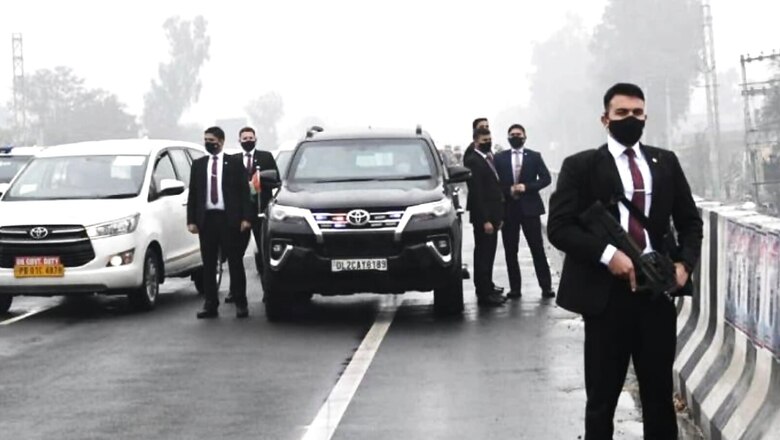
views
Amid the political fracas over the breach of Prime Minister Narendra Modi’s security in Punjab, sources told News18 that the Centre is mulling action against state police officials for their alleged failure to secure the route for the PM’s cavalcade.
Modi’s convoy was stranded on a flyover along the Moga-Ferozepur highway in poll-bound Punjab for 15-20 minutes on Wednesday after protesting farmers blocked the road, forcing the PM to return without attending a scheduled rally.
The incident has triggered a major political row, with the BJP alleging that the ruling Congress in Punjab “tried to physically harm” the Prime Minister, while other parties too attacked the state government over the law and order issue.
In a report submitted to the Centre, the Punjab government has said that the farmers’ protest along the route was “spontaneous” and added that an FIR had been registered into the matter. A central team, too, reached Punjab on Thursday to investigate “serious lapses” in the PM’s security.
Speaking to News18, officials in the central government said the state cannot escape responsibility under Section 14 of the SPG Act.
Section 14 states: “It shall be the duty of every Ministry and Department of the Central Government or the State Government or the Union Territory Administration, every Indian Mission, every local or other authority or every civil or military authority to act in aid of the Director or any member of the Group whenever called upon to do so in furtherance of the duties and responsibilities assigned to such Director or member.”
Action under this Act could mean the Centre summoning state officials on deputation like it had done in December 2020 when BJP national president JP Nadda’s convoy was attacked in West Bengal ahead of Assembly elections.
The Ministry of Home Affairs had back then issued unilateral summons to three IPS officers of West Bengal to serve on central deputation for alleged dereliction of duties.
The three officers — Bholanath Pandey (SP, Diamond Harbour), Praveen Tripathi (DIG, Presidency Range) and Rajeev Mishra (ADG, South Bengal) — were responsible for the security of the BJP chief during his December 9-10, 2020 visit to the politically volatile state.
The Home Ministry’s move had become another flashpoint in tense Centre-State relations with the Mamata Banerjee government refusing to release the trio of officers for central deputation.
“This act is nothing but a deliberate attempt to encroach upon the State’s jurisdiction and demoralise the serving officers. This move, particularly before the elections is against the basic tenets of the federal structure. It’s unconstitutional & completely unacceptable,” Banerjee had said back then.
For IAS, IPS and Indian Forest Services, officers of the state cadre are allotted by the Centre. From time to time, a certain number of officers are sent on central deputation. The Home Ministry is the authority in control of IPS cadre and the Department of Personnel and Training for the IAS cadre.
Usually, the state government’s consent is taken before any all India service officer is called to serve on central deputation.
Talking about any dispute over deputation, Rule 6(1) of the Indian Police Service (Cadre) Rules, 1954, says: “In case of any disagreement, the matter shall be decided by the central Government and the state government or state governments concerned shall give effect to the decision of the Central Government.”
Under the Home Ministry’s deputation policy for IPS officers, “if an officer on offer is selected for a Central posting and does not report either on his own or at the instance of the State Government, he would be debarred for consideration for a post under the Government of India for a period of five years. Officers, who have already been debarred, should not be offered before the debarment period is over.”
Being debarred from central deputation, however, hardly matters if an official prefers to work in their state.
Read all the Latest India News here




















Comments
0 comment